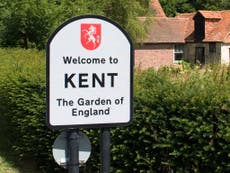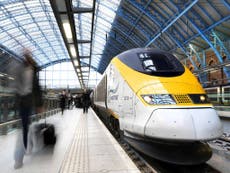Your support helps us to tell the story
From reproductive rights to climate change to Big Tech, The Independent is on the ground when the story is developing. Whether it's investigating the financials of Elon Musk's pro-Trump PAC or producing our latest documentary, 'The A Word', which shines a light on the American women fighting for reproductive rights, we know how important it is to parse out the facts from the messaging.
At such a critical moment in US history, we need reporters on the ground. Your donation allows us to keep sending journalists to speak to both sides of the story.
The Independent is trusted by Americans across the entire political spectrum. And unlike many other quality news outlets, we choose not to lock Americans out of our reporting and analysis with paywalls. We believe quality journalism should be available to everyone, paid for by those who can afford it.
Your support makes all the difference.Once we’ve taken back control of our borders, there’s absolutely nothing to stop us putting one up around Kent, and now Michael Gove has now announced that that’s exactly what he’s going to do.
What better way to show the world that we are an independent nation, once again, than by putting up borders right across the middle of our newly, fully re-sovereigned country?
The admission slipped out during Mr Gove’s latest statement to the House of Commons on preparations for the end of the transition period. He did his best to conceal it behind his now stock collection of what can only be described as, well, utter bollocks.
We would learn, yet again, that we are ready to leave the European Union with an “Australian-style deal”, which is, to be clear, no deal at all. An “Australian-style deal” equally accurately describes the deal through which Kidderminster Harriers FC last week signed Lionel Messi, in that it didn’t happen. It doesn’t exist. An “Australian-style deal” is a no-deal Brexit, and as we now know, no Whitstable or Gravesend either.
We would hear how the money we will no longer send to the EU can be “invested in our priorities”. Which is, nominally true, in the sense that once you’ve been made redundant you are then free to invest your train fare in other “priorities”, like scratchcards, or indeed pandemic-resistant Brexit analogies.
It was only in reply to a question from a backbench MP wanting to know quite what was going on with the rumoured 7,000-long lorry queues, and the 29 new lorry parks in Kent, that Mr Gove announced not just the new “Kent Access Permit” but also that it would be enforced by police along the border.
From 1 January 2021, lorry drivers won’t be able to enter the county of Kent without a permit, and if they try to sneak in, well, the police will be there to turn them back.
So that’s one new Brexit border in the Irish Sea, and another in the middle of the Dartford tunnel.
Still, there are “exciting opportunities ahead” (© Michael Gove), and the Kent border wall presents much to get excited about (no news yet on whether Sussex is gonna pay for it).
We look forward to seeing Nigel Farage, out with his little camera crew, patrolling the M20, sending illegal Kent-based immigrants back where they came from, which in this case is likely to be Sidcup.
There was, sadly, no news on how many of the promised 50,000 new customs agents have been recruited and trained as part of what the government has called its expansion into the “customs sector”. Gove did, however, repeat that now we have left the EU we will be free to invest in “increasing our productivity”, possibly even to somewhere around the levels of France, Germany or any of the more than a dozen EU countries who currently outperform us without having had to leave the EU to do it. Whether hiring the equivalent of the entire population of Canterbury to fill in customs forms will do it, we can only wait and see.
It is, after all, only 100 days until the end of the year, and the end of the transition period, when Britain leaves the single market, the customs union and is free to do its own thing, even if that thing is policing its own county borders.
The “transition period” began, by the way, on 31 January, which just so happened to also be the day of the country’s first confirmed case of Covid-19. And who can honestly say that anything that’s happened since could possibly give them any doubt about whether the government will absolutely definitely be ready for everything?




Join our commenting forum
Join thought-provoking conversations, follow other Independent readers and see their replies
Comments